|
|
|
Sort Order |
|
|
|
Items / Page
|
|
|
|
|
|
|
| Srl | Item |
| 1 |
ID:
177207
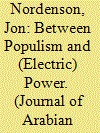

|
|
|
|
|
| Summary/Abstract |
Kuwait faces the double challenge of potentially destabilising effects of climate change as well as a changing international energy market in favour of renewables that may threaten the foundation of the oil-based economies dominating the region. Both these challenges point to the need for a transition towards more renewable energy sources and not least more sustainable patterns of energy consumption –– a transition that will be demanding for state and society alike. A successful green shift depends on a certain level of popular support or acceptance, yet it has proven difficult for the Kuwaiti government to gain support for their proposed solutions, and to reconcile the necessary changes with the existing relationship between state and society. This paper explores these challenges by studying public discourse concerning two contentious issues that are at the heart of the government’s economic reforms and of Kuwait’s planned efforts to cut GHG-emissions, namely fuel subsidy reform, and water and electricity conservation.
|
|
|
|
|
|
|
|
|
|
|
|
|
|
|
|
| 2 |
ID:
172562
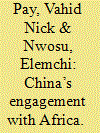

|
|
|
|
|
| Summary/Abstract |
This paper seeks to explore the political implications of China's economic relationship with Africa using the case study of Sino-Nigerian economic relations. China – perhaps the most prominent rising economy of the contemporary era – and Nigeria – one of the Africa's largest economies with a fast-growing consumer population – provide an ideal context to study the economic significance of bilateral ties for the ‘Global South.’ Nigeria's prospects of sustained economic growth, through Sino diplomatic relations, could appear relatively bleak considering issues involving its growing debt burden, unequal trade composition and deteriorating governance standards, some of which are attributable to China. This paper explores both sides of the argument before concluding that certain political aspects of Sino-Nigerian bilateral relations do indeed undermine sustainable economic development in the long run. It is argued that unequal economic practices, lack of transparency, disregard for environmental concerns, exclusion of civil society and absence of serious engagement with wider social actors and other checks and balances could indeed nurture elements of rentierism across Africa – particularly in resource-rich countries like Nigeria leaving significant detrimental effects that could well outweigh short-term gains.
|
|
|
|
|
|
|
|
|
|
|
|
|
|
|
|
| 3 |
ID:
183855
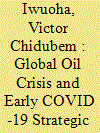

|
|
|
|
|
| Summary/Abstract |
African countries have been hit by a dual shock of COVID-19 pandemic and global oil crisis, which have caused severe economic and social disruptions. Most studies shed light on the correlates between COVID-19 and the global oil crisis, including their economic impacts on oil producing/exporting countries. However, the objective of this study is to examine the effects of the global oil crisis on the implementation of World Health Organization’s (WHO) healthcare and public health measures to contain COVID-19 in Nigeria. Empirical data from Nigeria was collected and analysed using content analysis based on WHO’s methodology. There was low level of healthcare preparedness and emergency response capacities to contain the COVID-19 pandemic. Public health measures against COVID-19 such as lockdowns and social distancing policies were poorly implemented at the expense of the people without adequate countercyclical stimulus packages and palliatives.
|
|
|
|
|
|
|
|
|
|
|
|
|
|
|
|
| 4 |
ID:
163230
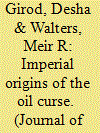

|
|
|
|
|
| Summary/Abstract |
The literature maintains that oil creates a curse on development in countries with weak national institutions at oil discovery, but offers little guidance on the specific institutions that help leaders avoid the curse. We trace rent distribution in Kuwait and Oman, apparent outliers that experienced development despite their weak national institutions at oil discovery. Unlike other examples of the oil curse, Kuwait and Oman contained a strong informal institution that compelled rulers to spend oil revenues on human development: a balance of power between leaders and their domestic rivals. Because informal balances of power are also present in countries with strong formal institutions that avoid the oil curse, this article suggests that the presence or absence of informal balances of power may help account for whether oil is a blessing or a curse.
|
|
|
|
|
|
|
|
|
|
|
|
|
|
|
|
| 5 |
ID:
104439
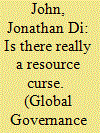

|
|
|
|
|
| Publication |
2011.
|
| Summary/Abstract |
This article provides a critical survey of the resource curse-the idea that mineral and fuel abundance generates negative developmental outcomes in less developed countries. In particular, it examines the idea that mineral and fuel abundance generates growth-restricting forms of state intervention, extraordinarily large degrees of rent seeking, and corruption, which are generally argued to be negative in terms of the developmental outcomes they generate. The analysis surveys the Dutch disease, rentier state, and rent-seeking versions of the resource curse and finds they have significant shortcomings in terms of theory and evidence. It also identifies some decisive factors that help determine the blessing threshold-below which the risk of a resource curse may be very high-in mineral and fuel abundant developing countries.
|
|
|
|
|
|
|
|
|
|
|
|
|
|
|
|
| 6 |
ID:
135040
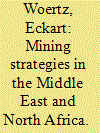

|
|
|
|
|
| Summary/Abstract |
This article provides a mapping exercise of the economic importance of non-hydrocarbon minerals (nhm) in the Middle East and North Africa (mena) and shows how governments in the region increasingly perceive them as strategic resources. The focus is on Saudi Arabia and other Gulf countries, Turkey, Morocco and Iran. nhm like iron ore, phosphates, aluminium and uranium are important for development models in the region, either as export commodities or as vital input factors. Since the 1990s, and as elsewhere in the world, the sector has witnessed privatisation and the promulgation of new mining codes. Yet governments have retained core capabilities and manage most key commodities themselves either directly or indirectly. Mining projects have met with opposition from labour representatives. They also have considerable environmental impact. The article discusses rentier state and resource curse theories, but argues that nhm have also increased development options and have contributed to economic diversification rather than being just a curse.
|
|
|
|
|
|
|
|
|
|
|
|
|
|
|
|
| 7 |
ID:
152543
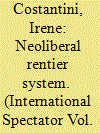

|
|
|
|
|
| Summary/Abstract |
The Islamic State’s conquest of swathes of Iraqi territory, combined with falling oil prices, revealed the fault lines of a model of economic development that made the country extremely vulnerable to the events of 2014. Over the last 13 years, the consolidation of the rentier economy in parallel to the promotion of a neoliberal model – a neoliberal rentier system – has not initiated a process of sustainable economic development. The main factors explaining this missed opportunity can be found in the tensions that exist between the two models and, in particular, between the relative roles of the state and the private sector as drivers of economic development.
|
|
|
|
|
|
|
|
|
|
|
|
|
|
|
|
| 8 |
ID:
097885
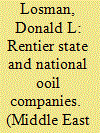

|
|
|
|
|
| Publication |
2010.
|
| Summary/Abstract |
While the concept of the rentier state is common knowledge to Middle East scholars, very little has been written concerning the basic support and revenue tool for such states - the national oil companies. This article examines the micro-economic, financial, and managerial behavior of national oil companies, assesses their economic efficiency, and relates their operations to rentier state politics.
|
|
|
|
|
|
|
|
|
|
|
|
|
|
|
|
| 9 |
ID:
156629
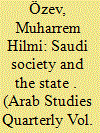

|
|
|
|
|
| Summary/Abstract |
This article considers religious, social, political, and economic dimensions of the
Saudi-Wahhabi state imagination. Since the inception, the Saudi state has relied on two
main pillars: the monarchy and Wahhabism, which have been in a symbiotic relationship.
In time, the state imagination in Saudi Arabia has been determined and reconstructed
by factors like Wahhabism, monarchism, rentierism, internal and international political
and economic obligations, and modernization efforts imposed by being a “nation state.”
Those factors made Saudi Arabia a sui generis state. The legitimacy of the monarchy has
been ensured through tribalism and, on a larger scale, religion. Foreign aid, booties, oil
revenues, and, on a rather insignificant scale, tax revenues have created a material infrastructure
to build citizenship.
|
|
|
|
|
|
|
|
|
|
|
|
|
|
|
|
| 10 |
ID:
124147
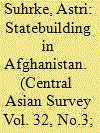

|
|
|
|
|
| Publication |
2013.
|
| Summary/Abstract |
This article lays out a critical perspective on statebuilding in Afghanistan after 2001, arguing that the massive international intervention had inherent contradictions which undermined the prospect of creating an Afghan-owned, liberal new order. Tensions related to the rentier-state condition, local ownership versus international control, and building peace while waging war are examined in detail. It follows from this analysis that the scaling-back of the international presence, now in process, is a necessary precondition for more accountable, autonomous, and sustainable statebuilding. The transition itself may be violent, with intensified competition for power and over new sources of rent. Yet it opens up new space for the Afghans themselves to re-establish a functioning and legitimate state, based on long-term bargains between elites and subjects and a measure of compromise among contesting ethnic and sectarian groups.
|
|
|
|
|
|
|
|
|
|
|
|
|
|
|
|
| 11 |
ID:
157504
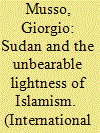

|
|
|
|
|
| Summary/Abstract |
The regime ruling Sudan since 1989 represents a pioneering experiment in the field of Islamist politics, being the first case in which a movement affiliated with the Muslim Brotherhood managed to conquer power and hold on to it for a considerable time. During the late 1990s, internal and external pressures threatened the survival of the regime, leading the ruling class to abandon its ambition to represent a model of revolutionary Islamic governance. Oil exports provided a catalyst for this pragmatic shift, intensifying patronage-based relations at the expense of ideological affiliation. Seen from a political economy perspective, the Sudanese experience proves the flexibility of Islamism as an ideology, but also its failure as a political practice to constitute a real alternative to the authoritarian dynamics that are widespread in the MENA region.
|
|
|
|
|
|
|
|
|
|
|
|
|
|
|
|
| 12 |
ID:
188173
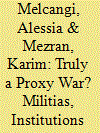

|
|
|
|
|
| Summary/Abstract |
Analyses of the Libyan conflict from the 2011 revolt onward have tended to define it as a ‘proxy war’, especially because of the relevant role played by foreign actors and their intermingling with various local factions. However, this definition does not stand up to closer examination and definitely does not fit with the specifics of the Libyan case. Through a combined analysis of the three theoretical concepts of ‘areas of limited statehood’ (ALS), ‘rentier state’ and ‘proxy war’, after an examination of the role played by militias, economic institutions and external actors in the conflict, it is argued that the classic concept of proxy war does not fully apply to the war in Libya.
|
|
|
|
|
|
|
|
|
|
|
|
|
|
|
|
|
|
|
|
|